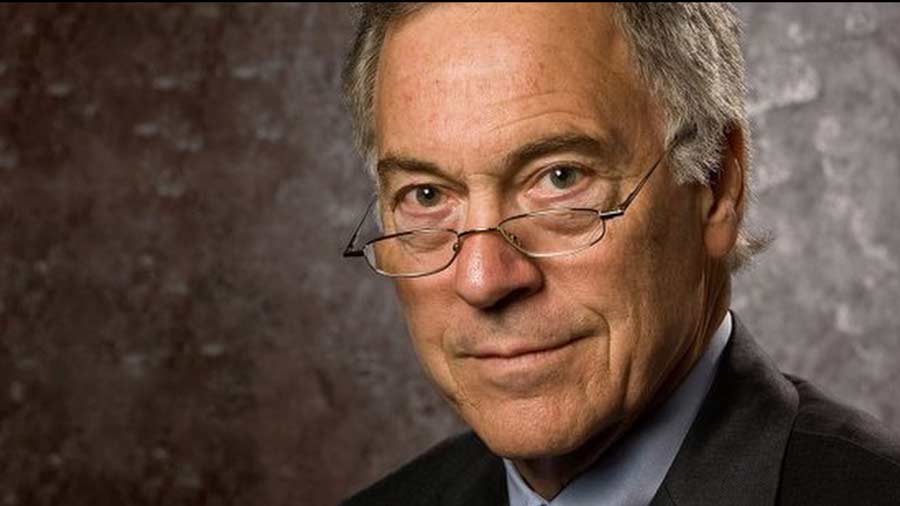
Economist Steve Hanke claims that the path Bukele is taking with his words and deeds is the same as that taken by populist leaders on their path to the establishment of totalitarian regimes.
Renowned economist and professor in the United States, Steve Hanke wondered in a new article published by the Cato Institute, why introduce an unproven idea (like Bitcoin) into a (dollarized) monetary system that works well?
His answer is simple: “It’s just a piece in Bukele’s broader scheme for absolute power,” he says. And he supports it with these statements:
Contrary to the libertarian view presented by some proponents of digital currency, Article 7 of the new law of El Salvador makes Bitcoin not only a legal tender currency, but also a “forced offer.” If a Salvadoran offers Bitcoin to a trader or financial institution, must be accepted. Compulsory bidding laws such as Article 175 of the Civil Code of the Soviet Union are a basic communist element and are also common during military occupations, “he explained.
“The path that Bukele is marking with his words and deeds goes through all the stages that populist leaders went through on their path to the establishment of totalitarian regimes,” he notes.
Hanke, who has been a major critic of Bukele’s economic measure, adds that in just over two and a half years since he was first elected, Bukele has crushed the two powerful political parties that could oppose him. .
Week in red for Bukele government: bonds go downhill for fear of re-election
In addition “he has used illegal and abusive tactics, such as cutting the funding of his competition before the National Assembly elections in February 2021. If that was not enough, he invaded the National Assembly with heavily armed soldiers. as a show of power. On May 1, with the control of the National Assembly, Bukele fired the Attorney General, who had initiated investigations into flagrant corruption in the Bukele government. “
“At the same time, he fired the five judges of the Constitutional Chamber of the Supreme Court who had been trying to enforce the rule of law to discipline Bukele. He replaced those thorns in his side with” yes, men. ” , the president ordered the National Assembly to exempt his government from disclosing its pandemic-related expenses.If that were not enough, Bukele also announced that he would completely reform the Savior’s constitution and remove the clause banning the government. single party “
Hanke further notes that this month, “Bukele’s lackeys in the National Assembly passed two laws that will remove all state judges and prosecutors over the age of 60. This move was made because some of the veterans were targeting Bukele. The culmination of Bukele’s search for absolute power came last week when members of the new Constitutional Chamber elected by Bukele gave the green light to Bukele to run for re-election for a consecutive term, something explicitly said. prohibited in the constitution of the Savior “.
“Where is Bukele’s pursuit of absolute power going? It will put the Savior in a lot of trouble. Less than a month after the Bitcoin Act was passed by the United States Department of State on July 1 , published the Engel List, a list of corrupt and anti-democratic actors in El Salvador, Guatemala and Honduras.Of the 14 Salvadorans appointed, 11 are close to Bukele, including his chief of staff, labor minister, deputy security minister and legal adviser “The 14 Salvadorans have been sanctioned,” he said.
“In response, and to divert the public’s attention, Bukele doubled down. In a dramatic television appearance, he launched his own anti-corruption campaign. According to Bukele, it was not his administration and his friends who were corrupt, but also his predecessors, then ordered the arrest of a former president and several former ministers, and also expelled Daniel Lizárraga, a respected journalist from El Far, a digital news publication in El Salvador, who had been investigating corruption in El Salvador. Bukele’s ranks.Ironically, Bukele’s new anti-corruption initiatives began shortly after it was disbanded by the International Commission against Impunity in El Salvador (CICIES), the country’s anti-corruption body.
The economist adds in his analysis: “The most recent slap in the hands of Bukele’s authorities came on September 5 when the US State Department issued an impressive press release addressed to Bukele. it says it all: “The decision of Salvadoran re-election undermines democracy.” And with the adoption of Bitcoin as a forced bid, this will not be the last slap. violate 27 of the International Financial Action Task Force (FATF) virtual asset regulations The FATF is the international police against money laundering and terrorist financing.Once El Salvador is marked, it will face sanctions by the 39 FATF member countries and more than 200 affiliated nations.
At the end of his article Hanke ends by stating, “Like most authoritarians, Bukele has a delusional side. He believes the Savior’s Bitcoin Law will provide an endless stream of funding for his grand plans.”
MORE ON THE TOPIC:
Marc Falzon: “Bitcoin in El Salvador has not been a launch, it has been a collapse”
Some do “business” with the Chivo wallet and others experience how volatile Bitcoin is
Chivo Wallet can share user data with companies